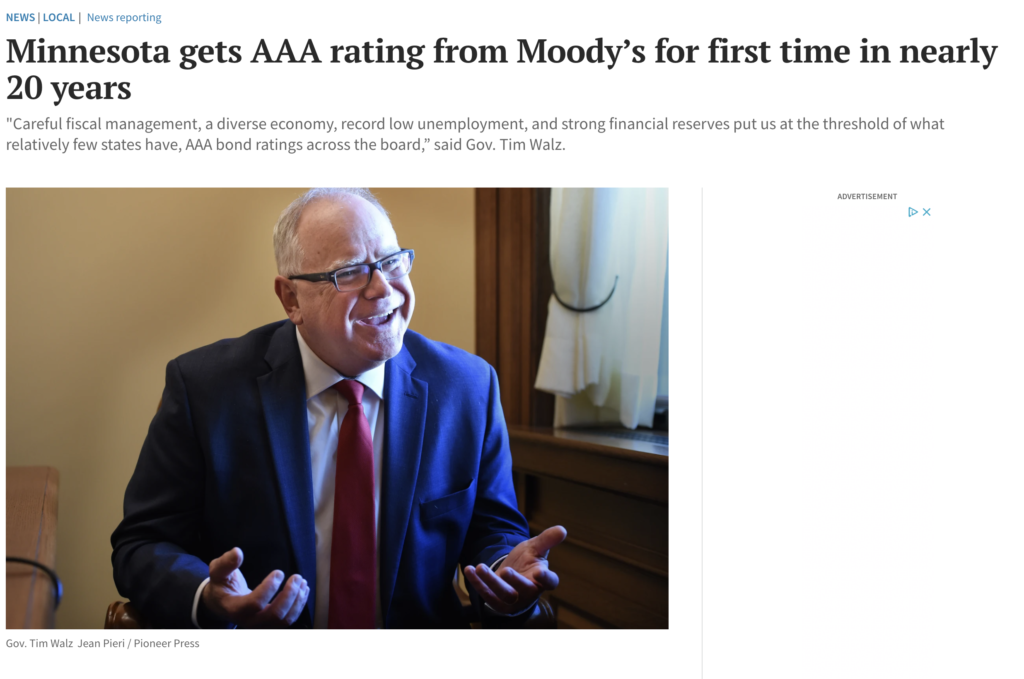Minnesota GOP gubernatorial candidate Scott Jensen has one huge advantage over DFL Governor Tim Walz – rural voters. If Jensen wins in November, and he might because of frustration over crime and inflation, it will be because he successfully energized rural Minnesota. Rural areas have gotten reliably Republican, so yesterday’s FarmFest debate was the Twin Cities resident’s big opportunity to close the deal by stressing his rural development ideas.

But instead of using all of his time to make that case, Jensen apparently spent quite a lot of time emphasizing what he always seems to emphasize — COVID-related cray-cray.
I just don’t understand why Jensen is convinced that this is such a winning political issue for him. Early on, when little information was available, Jensen became a star on conservative news outlets like Fox News recklessly speculating about how the pandemic might turn out. But now that actual research has emerged, it’s clear that Jensen’s early guesses have turned out to be spectacularly, embarrassingly wrong.
Still, Jensen just can’t stop himself from going there:
- Quite incredibly, Jensen, a physician by training, still remains unvaccinated. Keep in mind, over 95 percent of physicians are vaccinated, putting Jensen in a very small minority of extremists in his profession. Moreover, an overwhelming majority of Minnesotans made a different decision. Seven out of ten (3.946 million) of them have gotten them fully vaccinated. Among the states, Minnesota has the second best rate of residents that have been boosted.
- Jensen also still expresses skepticism about vaccine effectiveness. But the facts are now in. They show that the vaccine has been highly effective in reducing hospitalizations and deaths, and have enabled Minnesota’s society and economy to return to normal. Despite all of this, Doc Jensen apparently still thinks preaching anti-vax myths to the small group of holdouts is wise political strategy.
- Beyond Jensen’s incessant vaccination nonsense, he somehow continues to recommend Minnesotans use the antiparasitic drug ivermectin. The federal Food and Drug Administration (FDA) has not approved ivermectin, because a number of medical studies have proven it to be ineffective and dangerous. But apparently Team Jensen is convinced that pushing this discredited quackery is going to get him elected.
- And then there is public health. Jensen maintains that Walz’s public health measures to limit COVID spread were unnecessary and ineffective. But the facts are now in, and Minnesota under Walz had one of the region’s best rates of COVID deaths per capita. If Walz had adopted the conservative hands-off public health approach used in neighboring South Dakota, 5,000 more people would have died, according to an analysis done by Dane Smith. That’s roughly equivalent to the population of Minnesota towns like Circle Pines, Luverne, Redwood Falls, Lindstrom, and Morris. Still, Jensen apparently is convinced that championing the demonstrably deadly South Dakota model is the best path to victory in November.
- Finally, Jensen claims that Walz protecting Minnesotans during the deadliest pandemic in a century destroyed the Minnesota economy. Again, the facts now tell us a very different tale. Minnesota currently has the lowest unemployment of any state in the nation (1.8 percent), a historic low. Minnesota’s state budget outlook is strong enough that it also recently had its bond rating upgraded to AAA for the first time in nearly 20 years. But Jensen remains convinced that Minnesotans will buy his contention that Walz’s pandemic response made the state into a dystopian economic hellscape.

Stop, Doc, just stop! Take it from fellow Republican Bill Brock: “Let me tell you about the law of holes: If you find yourself in a hole, stop digging.”
The next time Jensen gets in front of a group of farmers and rural residents, he should abandon his stale, disproven COVID kookiness. Instead, he should try focusing on things that actually impact his audience’s lives, such as drought relief, broadband expansion, education investment, paid family and medical leave, health coverage affordability, and road and bridge improvements.
